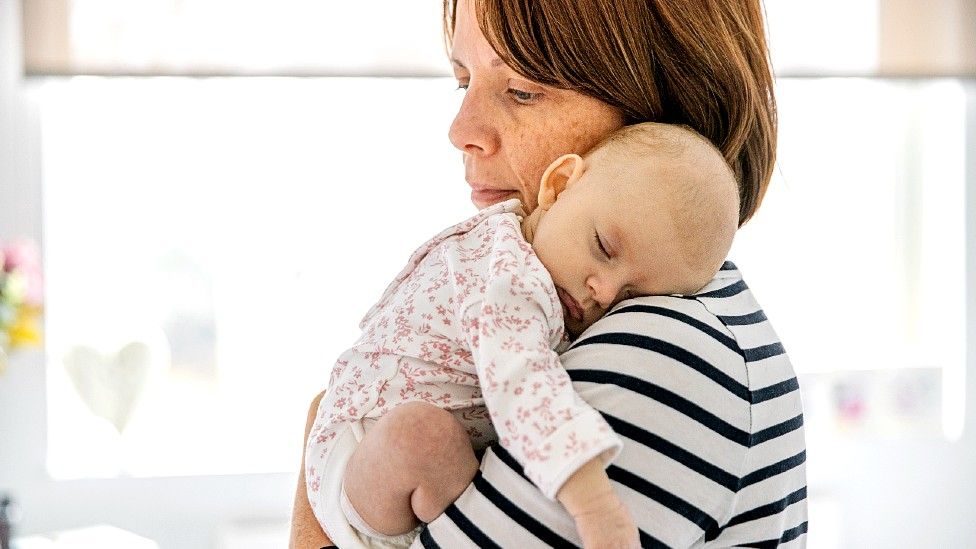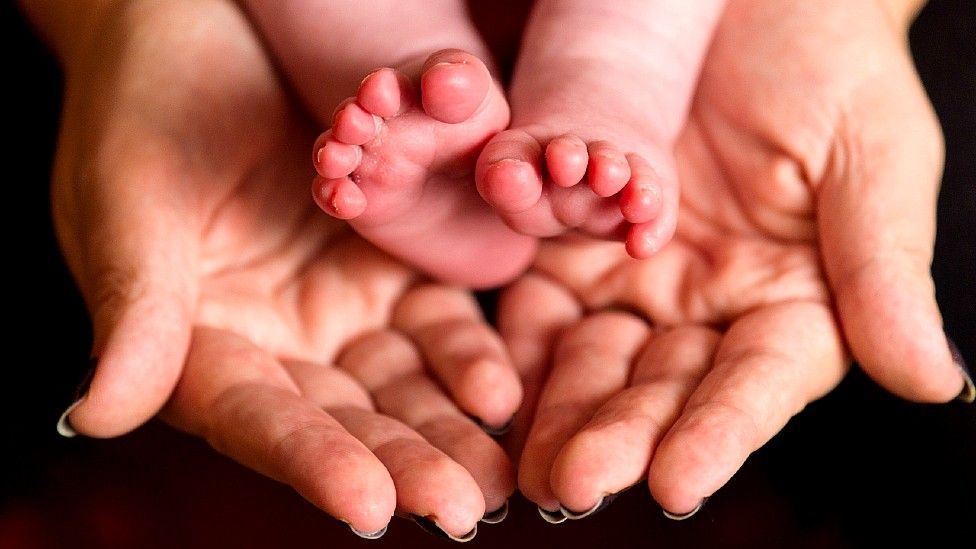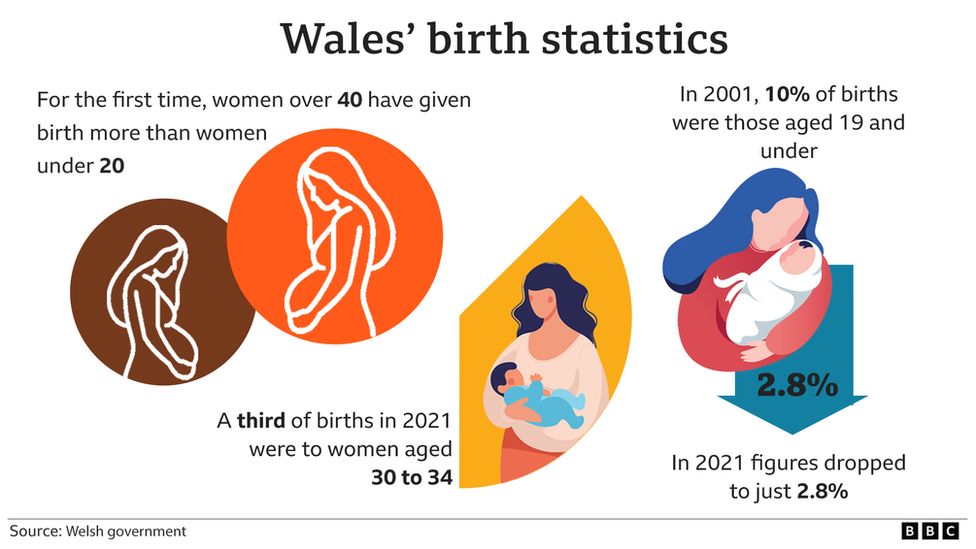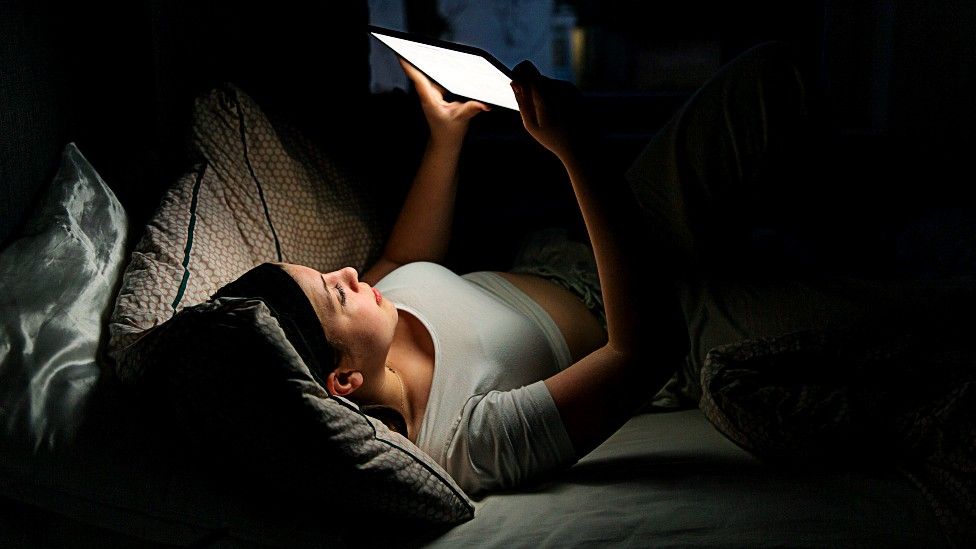More new mothers over 40 than under 20 in Wales

The age of motherhood is shifting relentlessly upward
The number of women giving birth aged over 40 has overtaken the number under 20 years of age for the first time.
The change is part of a general rise in maternal age, with more births also among 35-39 year olds than 20-24 year olds for the first time.
A third of births in 2021 were to women aged 30 to 34, the largest category, figures from the Welsh government show.
A health expert said policies would need to be put in place if governments wanted people to have children earlier.
Since the turn of the millennium, there has been a steady downwards trend in births among younger women.
In 2001, just over 10% of births in Wales were to those aged 19 and under. This number has fallen every year since 2004, with last year's figures showing just 2.8% of births were to teenagers.
 Increased education and career roles are big factors in later motherhood
Increased education and career roles are big factors in later motherhoodHowever, it is still the case that in certain areas, teenage motherhood remains a normalised experience for a significant number.
Although figures from the 2021 census show the population of Wales and England has grown since the previous one a decade before, it also shows that the population as a whole - like its mothers - is getting older, with the percentage of people aged over 65 at 21.3%, up from 18.4% in 2011.
Wales has a lower number of under-15s than any part of England, except the south-west, at 16.5%, which has implications for future populations both in terms of looking after today's expanding numbers of elderly and for the future impact on workforce size.
Is this something society should be concerned about looking to the future?

Wales is catching up with birth trends elsewhere, Prof Jacky Boivin says
Prof Jacky Boivin, a professor in health psychology at Cardiff University, said one of the clear impacts of moving towards an older age of motherhood is that women have fewer children overall.
She said: "Wales is catching up to the rest of the world. These are trends that have been happening in other countries and it's just taken a little longer in Wales.
"As people get older and they postpone having children, the number of children they have drops off. It's rare that people who want to have a child will decide not to have a child at all; they'll have fewer children.

"That's the impact of waiting a long time."
She said there were multiple factors contributing to the rise of older mothers.
"It takes longer to be in education and therefore people kick the can of parenthood [further down the road] and that could be just education per se takes a long time, or it could be the choices people are making, so certain courses are more difficult to make more compatible with parenthood," she said.
"Because education is time intensive and more people are going through higher degrees, and those are also time intensive, then more people are postponing having children.
"People want their career to be at the right stage in order to start having children and ostensibly it's just for stability, especially for women, because they could lose opportunities for advancement or if they're out of the market, completely lose opportunities for training and so on."
The changing role of women had meant more options for them might also make having children a harder choice than it once was.
And, with the increased likelihood that women are equally or more educated than men, finding a suitable partner can be a barrier, as traditionally women like to "marry up", according to the professor.
"As women have become more and more educated, there are fewer men to marry up to, and so we need a cultural shift in the fact that women ought to marry up. There's no need for this now anymore but it still exists," she explained.
Are screens stopping young people having sex?

Young people have lost opportunities to socialise because of increased time online
The cost of childcare in the UK could also be a factor.
"In countries where you have very liberal policies about childcare, where you get the money at an early age, like in Scandinavia under the age of three, more women will have children sooner," said Prof Boivin.
"But in countries like Germany where they don't provide any childcare until the baby is five, it's because they have a pro-natalist policy that says you should have your children at an early age and we want the mother to stay home, basically.
"So obviously, these women are even more likely to postpone for reasons to do with that."
At the other end of the age spectrum, early stage research being done at the Vienna Institute of Demography is pointing to two things, Prof Boivin says: one being the relative ease of access to contraception for teenagers to help them avoid unwanted pregnancy.
The other will come as no surprise to parents of teenagers everywhere.
"Young people have got out of the socialisation style that could lead to sexual encounters and unplanned births, basically which is usually when we say less than 20 is what we're thinking about," she said.
"[My colleague in Vienna] relates that back to screen time and a loss of opportunity for young people to meet, and to want to meet."
What are her solutions to encourage more people to have children earlier?
"We need to destigmatise things like solo parenthood or sufficient policies like being a parent while in [higher] education," she said.
"There may need to be policies around that facilitate people starting early, despite not having reached their career stages and not completed their education."
No comments:
Post a Comment